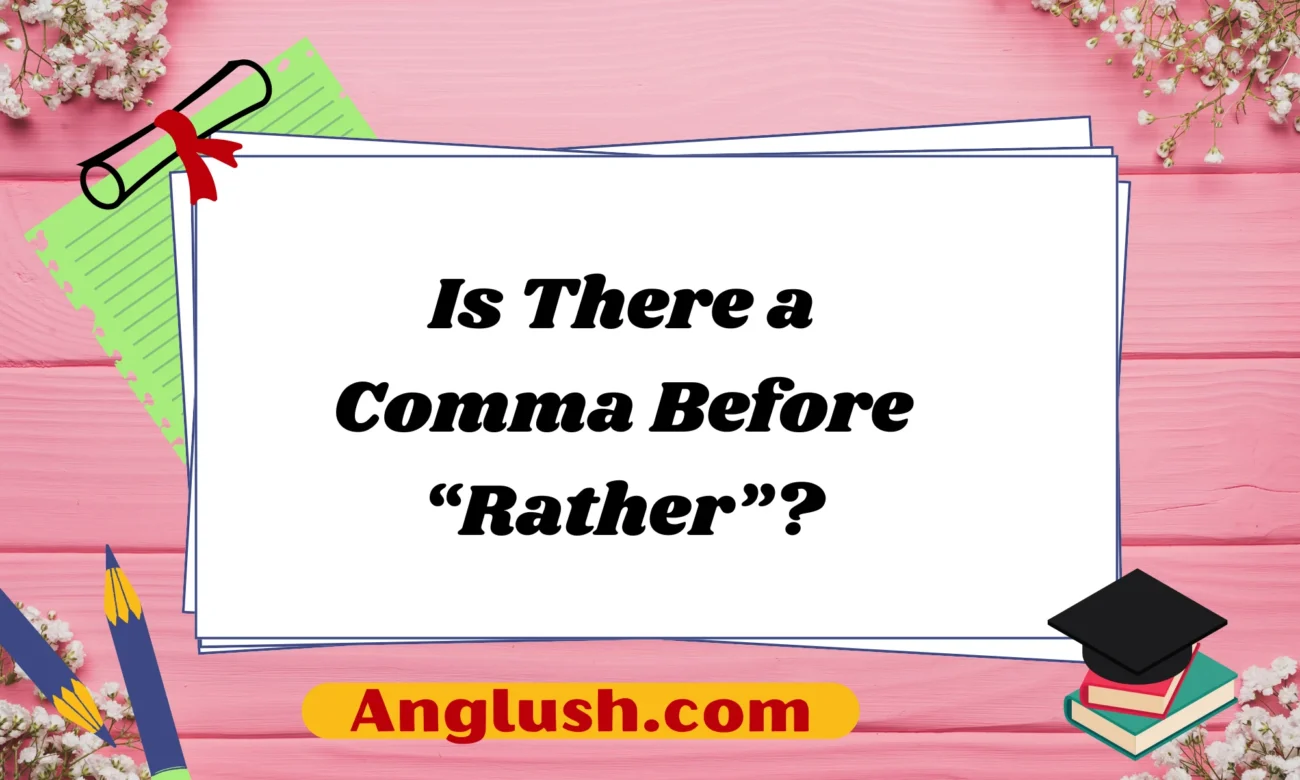Introduction
The use of commas in English can be tricky, especially when dealing with words like rather. Whether or not a comma should precede rather depends on its function within a sentence. This article will explore different scenarios in which rather is used, explain when a comma is necessary, and provide examples to clarify these rules.
Additionally, we will explore various alternative ways to express the meaning of rather in both formal and informal contexts. This will help ensure that your writing remains clear, professional, and grammatically correct.
When to Use a Comma Before Rather
1. Rather as a Conjunctive Adverb
When rather functions as a conjunctive adverb to indicate contrast between two ideas, a comma is typically required. This usage is similar to words like however, therefore, and nevertheless.
Example:
✅ I wanted to visit the mountains, rather, we went to the beach.
In this case, rather serves as a transition between two clauses and should be preceded by a comma.
However, in modern usage, rather is not commonly used as a conjunctive adverb. Instead, phrases like rather, we decided to… or instead, we went to… are more natural.
2. Rather as a Modifier in Comparisons
When rather modifies an adjective, verb, or adverb, it does not require a comma.
Example:
✅ The movie was rather interesting.
✅ He spoke rather softly.
Here, rather functions as an intensifier, meaning “somewhat” or “to a certain degree,” so no comma is needed.
3. Rather in a Contrasting Phrase
If rather introduces a contrast in the middle or at the end of a sentence, a comma is sometimes used for clarity, but it depends on the sentence structure.
Example:
✅ The weather was not cold, rather warm.
✅ She did not ignore the question, rather, she took time to think before answering.
In the first sentence, the comma is optional but helps readability. In the second sentence, the comma is necessary because rather introduces an independent clause.
4. Rather Than Phrases
When using rather than for comparisons, a comma is generally unnecessary unless separating two independent clauses.
Example:
✅ I would rather go to the movies than stay at home.
✅ She prefers coffee rather than tea.
✅ We went for a walk, rather than sitting inside all day.
A comma is only needed in cases where it enhances clarity or separates independent clauses.
Alternatives to Rather in Different Contexts
While rather is a useful word, there are alternative expressions that can be more natural depending on the situation. Here are some polite, professional, and casual replacements for rather.
1. Formal Alternatives
In professional writing, rather can sometimes sound outdated or stiff. Consider using these alternatives:
- Instead
✅ We should proceed with the original plan instead of making last-minute changes. - Preferably
✅ Preferably, the meeting should be scheduled for next week. - On the contrary
✅ On the contrary, the data suggests otherwise. - As opposed to
✅ She enjoys working independently, as opposed to being in a team setting.
2. Polite Alternatives
When expressing contrast in a polite manner, these options work well:
- More appropriately
✅ More appropriately, the term should be “cost-effective” rather than “cheap.” - To be more precise
✅ To be more precise, the report highlights a 12% increase in revenue. - Rather than that
✅ Rather than that, I would recommend a different approach.
3. Casual Alternatives
In everyday conversations, these alternatives sound more natural:
- Instead of that
✅ Instead of that, why don’t we just order pizza? - Better yet
✅ Better yet, let’s watch a movie at home. - If anything
✅ If anything, I think it’s a great opportunity.
4. Creative and Expressive Alternatives
For more expressive or dramatic effect, try these:
- By contrast
✅ By contrast, last year’s event was much smaller. - In a different way
✅ In a different way, this new design feels more modern. - Flipping the script (informal)
✅ Flipping the script, why not try something entirely new?
10 Texting Examples Using Rather and Its Alternatives
Here are ten user-friendly texting examples that show how to use rather and its alternatives in different contexts:
- “I’m not really into sushi, rather I’d go for pizza.”
- “Instead of working late, let’s finish this tomorrow.”
- “Better yet, let’s grab coffee first!”
- “I’d rather stay in tonight than go out.”
- “On the contrary, I think he did a great job.”
- “If anything, this makes me even more excited!”
- “More appropriately, we should call it an adjustment, not a failure.”
- “By contrast, this color looks much better on you.”
- “Rather than stressing out, just take it one step at a time.”
- “Flipping the script, let’s take a totally different approach.”
Conclusion
Whether or not a comma should come before rather depends on how it is used in a sentence. When functioning as a conjunctive adverb, a comma is typically needed, but when modifying an adjective or adverb, no comma is required.
If you want to replace rather with a more suitable word, consider using alternatives based on formality and context. In professional settings, instead, preferably, or on the contrary might be better choices. For casual conversations, better yet or if anything might sound more natural.
By understanding these nuances, you can ensure that your writing is clear, effective, and appropriate for any situation.

